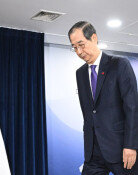[Editorial] Deputy Prime Minister Should Not Overstep His Authority
[Editorial] Deputy Prime Minister Should Not Overstep His Authority
Posted July. 04, 2005 04:39,
Han Duck-soo, the deputy prime minister and minister of finance and economy, overstepped his authority by assuring the public that there will be no rise in interest rates. Raising interest rates is not the responsibility of the Ministry of Finance and Economy but that of the Monitory Policy Committee under the Bank of Korea. This is because the decision should be made independently from the government as far as interest rates are concerned. In this regard, his remarks, which he is not in a position to make, will inevitably cause adverse side effects.
First and foremost, his remarks have put the monitory policy committee in a hot spot as the committee is scheduled to decide whether to adjust interest rates on July 7. Even when the committee makes an independent decision to freeze interest rates, the market is likely to get the wrong idea that the decision was influenced by the ministry. This could undermine the markets confidence in the interest rate policy of the Bank of Korea.
By contrast, if the committee decides to change interest rates, the disagreement between two major agencies is likely to cause greater confusion in the market.
The ministry can voice its opinion that there will be no substantial shock on the market such as huge capital flight even when U.S. interest rates are higher than those of Koreas. But the deputy prime minister is not in a position to make assertions that there will be no rise in interest rates. He could sound as if he encouraged the committee to go with his decision. And more careful analysis is required because not a few people disagree with the ministrys views that there is nothing to worry about when U.S. interest rates are higher than those of Korea.
The recent surge in market interest rates is blamed on both of the Bank of Korea and the Ministry of Finance and Economy. With mounting doubts on the effectiveness of low interest rate policies and a series of U.S. announcements to raise interest rates, there has been a growing expectation of higher interest rates in the market. At a monetary policy committee meeting held in May, there was an opinion that the impact of higher interest rates on the economy should be reexamined. And Park Byung-won, the vice minister of finance and economy, created momentum by saying, The government is currently agonizing over whether to raise interest rates or not.
From now on, the Bank of Korea and the deputy prime minister should stick to their own parts. The deputy prime minister should especially concentrate on adjusting and improving economic policies in accordance with market principles while keeping other agencies, including presidential advisory councils, in check, rather than intervening in interest rate decisions. He should understand that the market has been frustrated with him for making lame excuses for failed policies.







